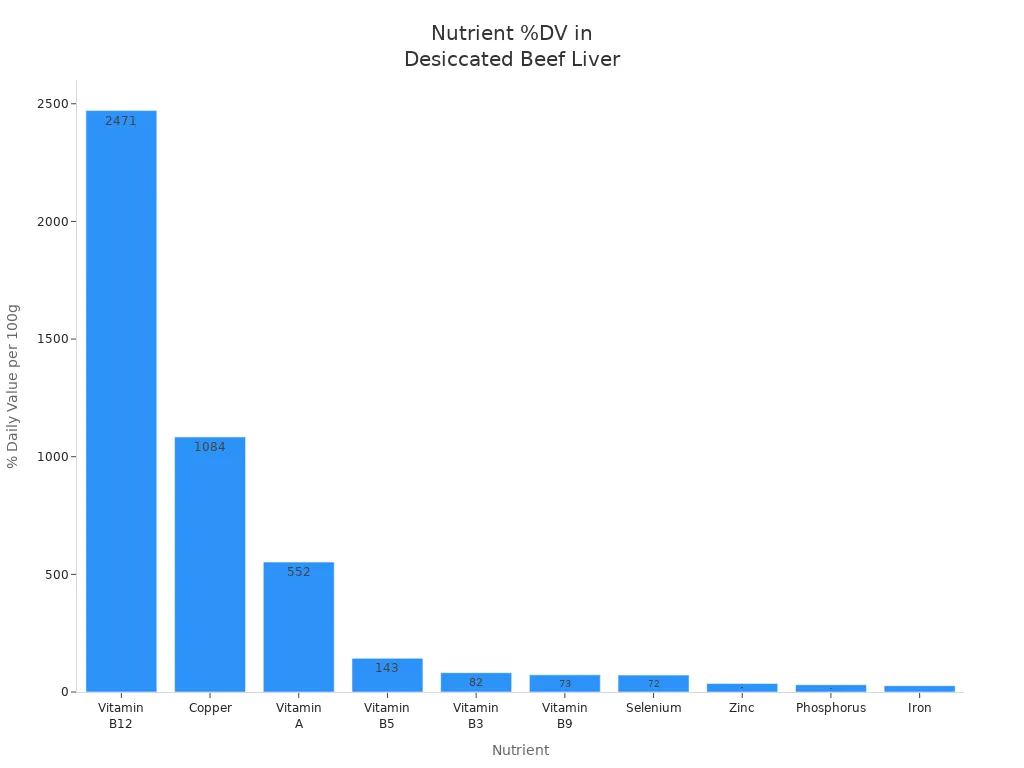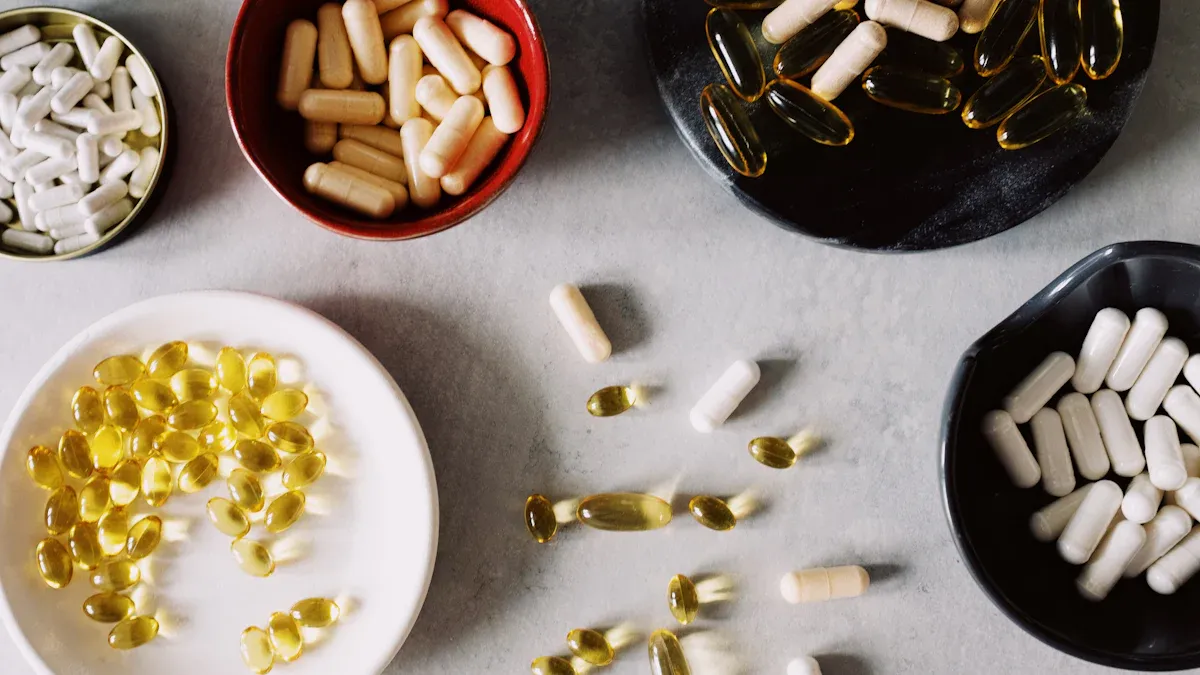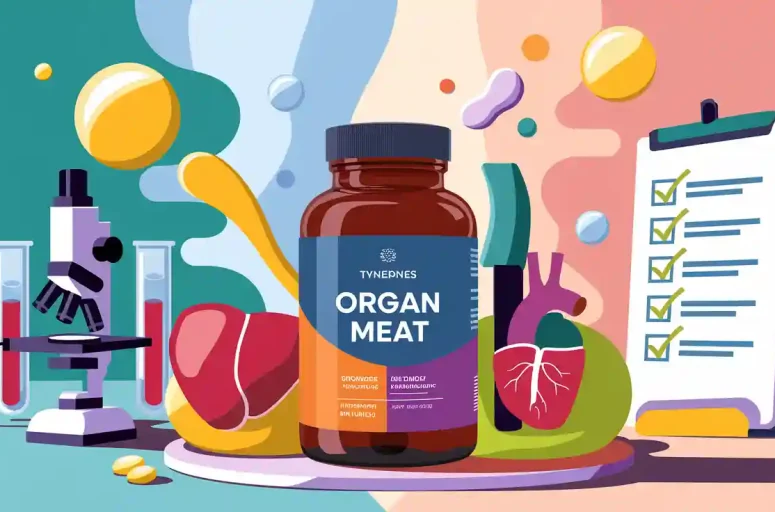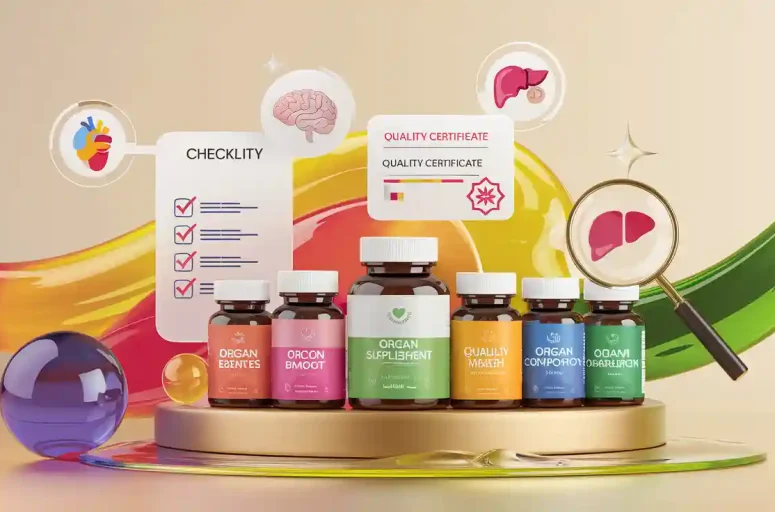
When you ask if desiccated beef liver or a multivitamin is better for health, the answer depends on your personal needs and goals. Many people view desiccated beef liver as “nature’s multivitamin” because it contains a wide range of nutrients in a natural form. On the other hand, multivitamins remain popular, with over 33% of adults in the United States using them regularly. Some people prefer the convenience and precise dosing of multivitamins, while others value the whole-food benefits of beef liver. You should think about what works best for you before choosing between desiccated beef liver vs multivitamin.
Medical Disclaimer: This information is for educational purposes only. Always talk to a healthcare professional before changing your supplement routine.
Key Takeaways
Desiccated beef liver offers natural, whole-food nutrients like vitamin A, B12, and iron that your body absorbs well.
Multivitamins provide a broad range of vitamins and minerals in precise doses, often in synthetic forms.
Both supplements carry risks: liver supplements can cause vitamin A toxicity if overused, and multivitamins may lead to overdosing on some vitamins.
Choose desiccated beef liver if you want a natural nutrient source with minimal additives and support for energy and blood health.
Pick multivitamins for convenience, easy swallowing, and to cover specific nutrient deficiencies or life stages.
Combining both supplements can increase nutrient coverage but raises the risk of excess vitamin A and iron; consult a healthcare provider first.
Always check supplement quality, labels, and follow recommended doses to stay safe and get the best benefits.
Supplements support your health but do not replace a balanced diet rich in whole foods.
Desiccated beef liver vs multivitamin: Quick Answer
Main Differences
When you compare desiccated beef liver vs multivitamin, you notice several important differences in nutrient content, absorption, safety, and convenience. The table below highlights the most significant contrasts:
Aspect | Desiccated Beef Liver Supplements | Multivitamin Supplements |
|---|---|---|
Nutrient Form | Natural, whole-food matrix with balanced nutrients | Synthetic or isolated nutrients in concentrated doses |
Bioavailability | High, due to natural complexes (vitamin A, B12, iron, CoQ10) | Variable; depends on vitamin forms and quality |
Risk of Overdose | Lower, but risk of vitamin A toxicity if overused | Higher, especially with fat-soluble vitamins |
Additives | Minimal, mostly pure | May contain fillers, colors, and additives |
Serving Size & Convenience | Larger capsules, harder to swallow | Small tablets, easier to take |
Nutrient Stability | Some loss during processing, but retains synergy | Stable, but may lack natural co-factors |
Energy Support | Sustained energy from bioavailable nutrients | Quick boost, depends on vitamin quality |
You get a natural blend of nutrients from desiccated beef liver. This supplement provides vitamin A, B vitamins, iron, copper, and rare peptides in a form your body recognizes. Multivitamins offer a wide range of vitamins and minerals, but many use synthetic forms that may not absorb as well. Some multivitamins include fillers and artificial colors, which can cause digestive discomfort.
Desiccated beef liver vs multivitamin also differs in safety. Liver supplements carry a risk of vitamin A toxicity if you take too much. Multivitamins can lead to overdosing, especially with fat-soluble vitamins like A, D, E, and K. Both options require you to follow recommended dosages and watch for side effects.
When to Choose Each
You should consider your health goals and lifestyle when deciding between desiccated beef liver vs multivitamin. Here are practical factors to help you choose:
If you want a whole-food supplement with natural nutrients, desiccated beef liver is a strong choice.
If you need a convenient, easy-to-swallow pill with precise dosing, multivitamins may fit your routine better.
If you seek support for energy, blood health, and immune function, desiccated beef liver provides bioavailable B vitamins, heme iron, and copper.
If you have specific nutrient deficiencies or want broad coverage, multivitamins offer a wide spectrum of vitamins and minerals.
If you prefer minimal additives and a pure product, look for high-quality desiccated beef liver from grass-fed cattle.
If you want to avoid taste and odor, both supplements come in capsule form, but multivitamins are usually smaller and easier to take.
If you worry about overdosing, monitor your intake of both supplements and avoid exceeding daily recommendations.
Tip: Always check the source and quality of your supplement. Choose products with transparent labeling and third-party testing.
You may find that desiccated beef liver vs multivitamin is not a simple choice. Your decision depends on your nutritional needs, preferences, and any health conditions. Some people even use both, but you should consult a healthcare provider before combining supplements.
What is desiccated liver?
Desiccated liver is a type of supplement made from real animal liver, usually from cows. You get a concentrated source of nutrients in a convenient capsule or powder. Many people choose desiccated liver as a whole-food source of vitamins and minerals. This supplement stands out among beef organ supplements because it delivers a wide range of nutrients in their natural form.
How It’s Made
You might wonder how desiccated liver becomes a supplement. Manufacturers use a process called freeze-drying to make these beef organ supplements. Here’s how it works:
They start with fresh liver from grass-fed, pasture-raised cattle.
The liver is sliced and quickly frozen.
Freeze-drying removes moisture at low temperatures, which helps preserve essential nutrients.
This process locks in vitamins like A and B12, minerals such as heme iron, and important amino acids.
The dried liver is then ground into a fine powder and put into capsules or used in multi-organ supplement blends.
Freeze-drying keeps the nutritional integrity of the liver intact. You get a nutrient-dense supplement that offers the benefits of eating fresh organ meats without the taste or preparation.
Key Nutrients in Liver
Desiccated liver is famous for its impressive nutrient profile. When you take these beef organ supplements, you get a powerful dose of vitamins and minerals that support your health. Here’s a look at the main nutrients found in a typical serving:
Nutrient | Amount per 3.5 oz (100g) Serving | % Daily Value (DV) |
|---|---|---|
Vitamin B12 | Extremely high | |
Copper | Very high | 1084% |
Vitamin A | Very high | 552% |
Protein | 20.4 g | N/A (see RDA below) |
Zinc | Moderate | 36% |
Phosphorus | Moderate | 31% |
Iron | Moderate | 27% |
Vitamin B5 | High | 143% |
CoQ10 | 5.1 mg | N/A |
Vitamin B3 | Moderate to high | 82% |
Vitamin B9 | Moderate | 73% |
Selenium | Moderate | 72% |

You get vitamin A for vision and immune support, vitamin B12 for red blood cell formation, and iron for energy. Folate helps with DNA repair, while zinc and selenium support your immune system. Protein in desiccated liver also helps you meet your daily needs.
Natural Nutrient Co-factors
Desiccated liver stands out from other beef organ supplements because it provides nutrients in their natural state. You benefit from the synergy of vitamins, minerals, and amino acids working together. This natural combination helps your body absorb and use these nutrients more effectively than isolated forms.
When you choose a multi-organ supplement, you get even more co-factors from different organs. Still, desiccated liver alone remains one of the most nutrient-dense options. You support your health with a supplement that delivers a broad spectrum of nutrients, just as nature intended.
Tip: If you want a whole-food source of nutrients, desiccated liver is a smart choice. It gives you the benefits of beef organ supplements in a form your body recognizes and uses well.
What is a multivitamin?
Multivitamins are dietary supplements that combine many essential vitamins and minerals in one product. You use multivitamins to help fill gaps in your diet and support your overall health. These supplements come in many forms and serve different needs, making them a popular choice for people of all ages.
Types of Multivitamins
You find a wide variety of multivitamins on the market. Manufacturers design these products for specific groups and health goals. Here are some common types you might see:
General multivitamins for daily use, providing a broad range of nutrients.
Multivitamins for men, often with less iron and added nutrients for prostate health.
Multivitamins for women, sometimes with extra iron, calcium, or folic acid.
Prenatal multivitamins for pregnant women, focusing on nutrients like folate and iron.
Senior multivitamins, which may include more vitamin D and B12.
Children’s multivitamins, often in chewable or gummy form, with nutrients for growth.
Multivitamins for specific dietary needs, such as vegan or gluten-free options.
You can choose from tablets, capsules, powders, liquids, gummies, and even effervescent tablets. Some multivitamins include extra antioxidants, herbs, or plant compounds to support wellness.
Common Ingredients
Most multivitamins contain a mix of vitamins and minerals that your body needs every day. You often see these ingredients:
Vitamins: C, B-complex (B1, B2, B3, B5, B6, B7, B9, B12), A, D2 or D3, E, and K.
Minerals: calcium, magnesium, zinc, iron, selenium, potassium, iodine, manganese, molybdenum.
Some products add amino acids, fatty acids, or herbal extracts.
Brands vary in the number and amount of nutrients they include. Some multivitamins have only a few vitamins, while others offer more than two dozen nutrients. You notice that children’s multivitamins focus on vitamins and minerals for growth, such as vitamin D, calcium, and iron. Newer forms like gummies may contain extra ingredients for taste and texture, such as citric acid or honey.
You should know that there is no standard definition for multivitamin supplements. This means that nutrient content and dosages can differ widely between brands. Most multivitamins keep nutrient levels below the upper intake limits, but you can risk getting too much iron, zinc, vitamin A, niacin, or folic acid if you combine supplements with a nutrient-rich diet.
Synthetic vs. Natural Forms
Multivitamins use both synthetic and natural forms of vitamins. You may wonder how these forms affect absorption and health benefits. Natural vitamins come from whole foods and include extra compounds and cofactors that help your body absorb and use them. Synthetic vitamins are made in labs and may lack these helpful cofactors.
For some vitamins, like vitamin C, studies show that your body absorbs both natural and synthetic forms equally well. For others, such as vitamin E, natural forms are absorbed much better than synthetic ones. Synthetic vitamins can also pose a higher risk of toxicity if you take too much, while natural vitamins usually come in balanced amounts that lower this risk.
Some brands use food-based multi-vitamin technology to create nutrients that your body recognizes and absorbs more easily. You get better bioavailability and support for your health when you choose multivitamins with natural or nature-identical ingredients.
Medical Disclaimer: This information is for educational purposes only. You should consult a healthcare professional before making changes to your supplement routine.
Nutrient content: desiccated beef liver vs multivitamin

When you compare the nutrient content of desiccated beef liver and multivitamin supplements, you see clear differences in both the types and forms of nutrients. Each option offers unique benefits for your nutrient intake and overall health. Let’s break down what you get from each.
Vitamins and Minerals in Liver
Desiccated beef liver stands out as one of the most nutrient-dense beef organ supplements available. You get a comprehensive nutrient profile that supports many aspects of your health. The freeze-drying process preserves the natural balance of vitamins and minerals, making these nutrients highly bioavailable.
B Vitamins
You find high levels of B vitamins in liver, especially b12. This vitamin plays a key role in energy production, red blood cell formation, and brain function. In fact, beef liver contains b12 in concentrations far above most foods, sometimes reaching up to 400 times the daily value in a single serving. Along with b12, you get other B vitamins such as B2 (riboflavin), B3 (niacin), B5 (pantothenic acid), B6, and B9 (folate). These nutrients work together to support metabolism, mood, and nervous system health. The natural form of these vitamins in beef organ supplements helps your body absorb and use them efficiently.
Iron and Minerals
Liver is also a rich source of iron, especially heme iron, which your body absorbs better than the non-heme iron found in plants. This makes desiccated beef liver a strong choice for supporting healthy blood and energy levels. You also get important minerals like copper, zinc, phosphorus, and selenium. Copper works with iron to help form red blood cells, while zinc and selenium support immune function and antioxidant defenses. The minerals in beef organ supplements come in a natural matrix, which helps your body use them more effectively than isolated forms.
You benefit from this diverse mix of nutrients, which supports eye health, immune function, skin health, and brain cognition. Many people call beef liver “nature’s ultimate multivitamin” because of its dense and varied micronutrient content.
Nutrients in Multivitamins
Multivitamin supplements aim to provide a wide range of essential vitamins/minerals in one convenient product. You find many different formulations, but most include the basic vitamins and minerals your body needs every day.
Dosages
Multivitamins usually contain set amounts of each nutrient, often close to the recommended daily values. You get vitamins like A, C, D, E, K, and the full B-complex, along with minerals such as calcium, magnesium, iron, zinc, and selenium. Some multivitamins offer higher doses for certain nutrients, but most stay within safe limits. The synthetic or isolated forms of these nutrients may not always absorb as well as those from whole-food sources like beef organ supplements. Some brands use natural or food-based forms, which can improve absorption.
Additives and Fillers
You should check the ingredient list when choosing a multivitamin. Many supplements contain additives, fillers, artificial colors, or sweeteners to improve taste, texture, or shelf life. These extra ingredients can sometimes cause digestive discomfort or allergic reactions. In contrast, high-quality beef organ supplements like desiccated beef liver usually contain minimal additives, focusing on pure, nutrient-rich content.
Note: Always read supplement labels to avoid unwanted additives and ensure you get the nutrients you need.
Missing Nutrients in Each
No supplement provides every nutrient your body needs. Desiccated beef liver gives you a powerful mix of vitamins, minerals, and other nutrients, but it lacks some elements found in plant foods, such as vitamin C and certain phytonutrients. You also get little to no calcium or fiber from liver supplements.
Multivitamins cover a broader range of nutrients, including those not found in animal products, like vitamin C and sometimes vitamin K2 or iodine. However, they may lack the natural co-factors and peptides present in beef organ supplements. The isolated nutrients in multivitamins might not work as well together as the naturally balanced nutrients in liver.
If you want the benefits of both, you might consider a multi-organ supplement, which combines several beef organ supplements for a wider range of nutrients. Still, you should remember that supplements are not a replacement for a balanced diet.
Medical Disclaimer: This information is for educational purposes only. Always consult a healthcare professional before making changes to your supplement regimen.
Absorption and bioavailability
Liver Nutrient Absorption
You may wonder how well your body absorbs the nutrients in desiccated beef liver. Freeze-drying preserves many nutrients, but some heat-sensitive vitamins, like certain B vitamins, may decrease during processing. The natural form of nutrients in beef liver, such as b12 and iron, often supports better nutrient absorption compared to plant sources. Your body recognizes these nutrients as food, which can help you use them more efficiently. However, the nutrient content in desiccated liver supplements can vary. Factors like the animal’s diet, age, and the way the liver is processed all affect the final product. This means your nutrient intake may not always match what the label says. Beef liver also contains preformed vitamin A, which your body absorbs easily, but taking too much can lead to toxicity.
Note: There are no direct human studies comparing the bioavailability of nutrients in desiccated beef liver to multivitamins. Most claims about superior absorption come from the natural food matrix, not from clinical trials.
Multivitamin Absorption
Multivitamins provide a standardized and transparent way to get essential nutrients. Manufacturers design these supplements to deliver consistent doses, so you know exactly what you are taking. The nutrients in multivitamins often come in synthetic or isolated forms. Some vitamins, like vitamin C, absorb well in both natural and synthetic forms. Others, such as vitamin E, absorb better from natural sources. Multivitamins may lack the natural co-factors found in whole foods, which can limit how well your body uses certain nutrients. Still, you benefit from the safety and predictability of standardized dosing. Clinically dosed multivitamins can help you meet your daily needs for b12, iron, and other key nutrients, especially if your diet lacks variety.
Multivitamins offer a reliable source of nutrients with clear dosing.
Synthetic forms may not always match the absorption of food-based nutrients.
Standardized profiles reduce the risk of nutrient overload or deficiency.
Role of Co-factors
Co-factors play a big role in how your body absorbs and uses nutrients. Desiccated beef liver contains natural co-factors, such as enzymes and antioxidants, that help your body process nutrients more effectively. These co-factors create a synergy, allowing nutrients to work together for better results. For example, beef liver provides folate in its active form, which benefits people with MTHFR gene variations. The balanced ratios of nutrients in beef liver support your body’s natural processes and reduce the risk of nutrient overload.
In contrast, multivitamins often lack these natural co-factors. The isolated nutrients may not interact as well, which can limit their effectiveness. Some people may not absorb synthetic forms as efficiently, especially if they have certain genetic differences. Choosing a supplement with natural co-factors can improve nutrient absorption and support your overall health.
Tip: Look for supplements that provide nutrients in forms your body can use, and consider the presence of co-factors for optimal nutrient absorption.
Energy and health benefits
Energy Support from Liver
You may notice a boost in energy when you add desiccated beef liver to your routine. This supplement contains iron and vitamin B12, which help your body make red blood cells and carry oxygen. If you feel tired because of low iron or B12, beef liver can help restore your energy. Folate in liver also prevents certain types of anemia, which can cause fatigue. The high protein content supports muscle recovery after exercise. Some studies on beef extract show improved exercise performance and less post-exercise fatigue. Researchers believe leucine in beef helps muscles recover by increasing glycogen stores. While these results look promising, scientists have not confirmed the same benefits for desiccated beef liver supplements. You should remember that direct clinical research on beef organ supplements and energy is limited.
Tip: If you feel tired often, talk to your doctor before relying on supplements. Fatigue can have many causes, and you may need more than just extra nutrients.
Iron and B12 in liver help prevent anemia-related fatigue.
Folate supports healthy blood and reduces tiredness.
Protein and leucine aid muscle repair and recovery.
Choline in liver supports brain functions like memory and mood.
Energy Support from Multivitamins
Multivitamins offer a convenient way to support your daily energy needs. These supplements provide a mix of B vitamins, vitamin C, and minerals that help your body turn food into energy. You may find multivitamins helpful if your diet lacks variety or you have trouble getting enough nutrients from food. Clinical trials have not shown a direct link between multivitamin use and increased energy levels. However, multivitamins can help fill gaps in your diet and prevent deficiencies that cause tiredness. If you have low levels of B vitamins or iron, a multivitamin may help you feel more energetic.
Multivitamins supply B vitamins for energy metabolism.
They help prevent nutrient deficiencies that lead to fatigue.
You get a balanced mix of vitamins and minerals in one pill.
Multivitamins do not guarantee an energy boost if you already eat a balanced diet.
Immune and Overall Health
Both desiccated beef liver and multivitamins support your immune system and overall health in different ways. Beef liver provides zinc and vitamin A, which help your body fight infections and repair cells. Choline in liver supports brain health and mood. The protein in liver helps your muscles recover and grow. Multivitamins supply vitamin C, zinc, and other nutrients that support immune function. In a clinical trial, older adults who took multivitamins had higher blood levels of vitamin C and zinc. They reported shorter and less severe illnesses, even though lab tests did not show big changes in immune markers. Multivitamins may not change your immune system directly, but they can help you recover faster from sickness.
Supplement Type | Immune Support Nutrients | Other Health Benefits |
|---|---|---|
Desiccated Beef Liver | Zinc, Vitamin A | Protein, Choline, B12, Folate |
Multivitamins | Vitamin C, Zinc | B vitamins, Iron, Magnesium |
Note: Supplements can help you meet your nutrient needs, but they do not replace a healthy diet or lifestyle.
Medical Disclaimer: This information is for educational purposes only. It does not replace medical advice. You should consult a healthcare professional before making changes to your supplement regimen.
Safety and side effects
When you choose a supplement, you should always think about safety and possible side effects. Both desiccated beef liver and multivitamins can support your health, but each comes with its own risks. Understanding these risks helps you make informed decisions and avoid unwanted problems.
Liver Supplement Risks
Vitamin A Toxicity
Desiccated beef liver contains high levels of preformed vitamin A. Your body absorbs this form of vitamin A easily, but too much can cause toxicity. Signs of vitamin A toxicity include headaches, dizziness, nausea, and even liver damage if you take large amounts over time. Children and pregnant women face a higher risk because their bodies are more sensitive to excess vitamin A. You should always follow the recommended serving size and avoid combining liver supplements with other high-vitamin A products.
Allergies
Although rare, some people may have allergic reactions to beef liver supplements. Symptoms can include itching, rash, swelling, or trouble breathing. If you notice any of these signs after taking a liver supplement, stop using it and seek medical help right away. People with known beef allergies should avoid these products completely.
Multivitamin Risks
Overdosing
Multivitamins provide many nutrients in one pill, but taking too much can lead to problems. Overdosing on fat-soluble vitamins like A, D, E, and K can cause harmful effects because your body stores these vitamins. Water-soluble vitamins, such as vitamin C and B vitamins, usually leave your body through urine, but very high doses can still cause issues like nerve damage or stomach upset. Children are especially at risk for overdose, as some children’s multivitamins contain high nutrient levels that can be dangerous if taken in large amounts.
Interactions
Multivitamins can interact with other supplements or medicines you take. For example, high doses of iron can interfere with certain antibiotics, and too much calcium can affect how your body absorbs other minerals. You may also experience mild side effects when starting a new multivitamin, such as constipation, diarrhea, upset stomach, or nausea. These symptoms are usually temporary and go away as your body adjusts. Rarely, people report headaches, nosebleeds, or trouble sleeping. Severe allergic reactions are very rare but need immediate medical attention if you notice hives, swelling, or trouble breathing.
Note: The risk of side effects increases if you combine multivitamins with other supplements or eat many fortified foods. Always read labels and talk to your doctor before starting a new supplement.
Medical Disclaimer: This information is for educational purposes only. It does not replace medical advice. Always consult a healthcare professional before making changes to your supplement routine.
Ease of use and cost
Convenience of Desiccated Liver
When you choose beef organ supplements like desiccated beef liver, you often look for convenience. These supplements come in capsule form, making them easy to add to your daily routine. Most brands suggest taking several capsules each day, usually four to six. Some users find the number of capsules and their larger size a bit inconvenient. You might also notice a slight beef taste, but this does not bother most people. The simple dosing instructions help you remember to take your supplement with food. Many users appreciate that beef organ supplements offer a natural, whole food source of nutrients without the need for meal prep. If you have a busy schedule, you can still get the benefits of beef organ supplements without extra cooking or planning.
Tip: Start with a lower dose if you are new to beef organ supplements, then increase as your body adjusts.
Multivitamin Convenience
Multivitamins are known for their simplicity. You usually take just one small tablet or capsule each day. This makes it easy to fit into your morning or evening routine. The small size and neutral taste of most multivitamins mean you can swallow them quickly, even if you do not like taking pills. You do not need to worry about taste or taking multiple capsules at once. For many people, this convenience is a big reason to choose multivitamins over other supplements. If you want a straightforward way to cover your daily nutrient needs, multivitamins offer a practical solution. You can find them in many forms, including gummies, liquids, and chewables, which adds to their appeal.
Price Comparison
Cost is an important factor when you compare beef organ supplements to multivitamins. The price per serving can vary between brands. Here is a table showing the cost per serving for some popular beef organ supplements:
Supplement Brand | Price (USD) | Servings | Cost per Serving (USD) |
|---|---|---|---|
Double Wood Supplements Grass Fed Beef Liver | 19.95 | 90 | 0.23 |
Equip Foods Grass-Fed Beef Liver Capsules | 29.74 | N/A | 0.99 |
MK Supplements Grass-Fed Beef Liver | 46.50 | 45 | 1.03 |
You see that the cost per serving for beef organ supplements ranges from $0.23 to $1.03. Prices depend on the brand, quality, and number of capsules per bottle. Multivitamins often cost less per serving, but prices can vary based on ingredients and brand reputation. While beef organ supplements may cost more, you get a natural source of nutrients with minimal additives. Multivitamins offer a budget-friendly option for those who want broad nutrient coverage at a lower price.
Note: Always check the label for serving size and ingredient quality before choosing any supplement.
Medical Disclaimer: This information is for informational purposes only. It does not replace medical advice. You should consult a healthcare professional before making changes to your supplement regimen.
Who should choose desiccated beef liver or multivitamin?
Best for Whole-Food Seekers
If you want nutrients from a whole-food source, beef organ supplements like desiccated beef liver may fit your needs. You get vitamins and minerals in their natural form, along with co-factors that help your body use these nutrients. Many people who follow a paleo or ancestral diet choose beef organ supplements because they want to avoid synthetic ingredients. You may also prefer whole-food supplements if you believe that nutrients from food work better together than isolated vitamins.
You get a natural balance of nutrients.
You avoid many additives found in other supplements.
You support your body with nutrients as nature intended.
If you value a simple ingredient list and want to avoid artificial colors or fillers, beef organ supplements offer a clean option. You may also find that whole-food supplements support your energy and immune health in a way that feels more natural.
Best for Specific Deficiencies
You may need a multivitamin if you have a known deficiency or belong to a group with higher nutrient needs. Multivitamins can help fill gaps that diet alone cannot cover. Some people need extra support due to age, health conditions, or life stages. The table below shows who may benefit most from multivitamin supplements:
Population / Condition | Health Condition or Deficiency Addressed | Notes on Effectiveness |
|---|---|---|
Neural tube defects, risk of small-for-gestational-age babies | Folic acid in multivitamins helps; reduces some birth defects | |
Older adults (65+) | Calcium, vitamin B12, vitamin D deficiencies | Multivitamins can help, but benefits for blood pressure or cognition are unclear |
People on restrictive diets | Nutrient gaps from vegan, gluten-free, or weight-loss diets | Multivitamins help, but good dietary planning may also work |
Post-bariatric surgery patients | Broad nutritional deficiencies | Multivitamins maintain status, but absorption may be reduced |
People with certain diseases | Deficiencies from malabsorption, diabetes, or medication use | Multivitamins may help, but absorption issues can limit effectiveness |

You may need supplements if you are pregnant, older, or have a medical condition that affects how your body absorbs nutrients. Multivitamins can provide a safety net when your diet or health makes it hard to get enough vitamins and minerals.
Special Considerations
You should think about your health goals, lifestyle, and any medical advice before choosing beef organ supplements or multivitamins. Some people may benefit from both types of supplement, but you need to watch for overlapping nutrients. For example, taking both liver supplementation and a multivitamin can increase your risk of getting too much vitamin A or iron.
Tip: Always read supplement labels and talk to your healthcare provider before starting new supplements.
If you have allergies to beef or certain additives, check the ingredient list carefully. Children, pregnant women, and people with chronic illnesses should use supplements with extra caution. You may also want to consider cost, convenience, and personal taste when making your choice.
Medical Disclaimer: This information is for informational purposes only and does not constitute medical advice. You should consult a healthcare professional before making any changes to your supplement regimen.
Can you take both together?
You might wonder if you can take desiccated beef liver and a multivitamin at the same time. Many people consider combining these supplements to cover all their nutrient needs. However, you should know that no clinical studies have tested the safety or benefits of using both together. Experts recommend caution because of the risk of getting too much of certain nutrients, especially vitamin A.
Benefits of Combining
Some people believe that taking both supplements gives you a broader range of nutrients. Desiccated beef liver provides natural forms of iron, B vitamins, and vitamin A. Multivitamins often include vitamin C, vitamin D, and other nutrients not found in beef liver. If your diet lacks variety, combining both may help fill nutritional gaps.
Potential Benefit | Explanation |
|---|---|
Broader Nutrient Coverage | You get nutrients from both animal and plant sources. |
Support for Deficiencies | Multivitamins can supply nutrients missing from beef liver, like vitamin C. |
Convenience | You may find it easier to meet daily needs without tracking every nutrient. |
Note: Even though you may get more nutrients, more is not always better. Your body can only use a certain amount each day.
Risks of Doubling Nutrients
Combining desiccated beef liver and multivitamin supplements increases the risk of getting too much of some nutrients. The biggest concern is vitamin A toxicity. Beef liver contains high levels of preformed vitamin A, and many multivitamins also include this nutrient. Too much vitamin A can cause nausea, headaches, liver damage, bone loss, and birth defects during pregnancy. Iron overload is another risk, especially if you take both supplements and eat iron-rich foods. Some beef liver supplements may also contain heavy metals or other contaminants, depending on the source.
Vitamin A toxicity: Too much preformed vitamin A from both supplements can harm your liver and bones.
Iron overload: Excess iron can cause digestive problems and other health issues.
Lack of standardization: Nutrient content in beef liver supplements varies, making it hard to know your exact intake.
Potential contaminants: Liver can store heavy metals, which may end up in your supplement.
Always check the labels for overlapping nutrients and avoid exceeding the recommended daily amounts.
Safe Use Tips
If you want to use both supplements, you should follow some safety tips:
Talk to your healthcare provider before starting or combining supplements, especially if you are pregnant, breastfeeding, or have health conditions.
Read supplement labels carefully to check for overlapping nutrients, especially vitamin A and iron.
Choose high-quality products from trusted brands that test for contaminants.
Start with the lowest recommended dose and monitor how you feel.
Track your total intake of key nutrients from food and supplements to avoid excess.
Manufacturers often suggest taking 2-4 beef liver capsules daily, but you may not need a full dose if you also use a multivitamin. Professional guidance helps you find the right balance for your needs.
Medical Disclaimer: This information is for informational purposes only and does not replace medical advice. Always consult a healthcare professional before making changes to your supplement regimen.
You have learned that both desiccated beef liver and multivitamin supplements offer unique advantages. Experts highlight that multivitamins provide standardized, evidence-backed nutrients, while beef liver supplements deliver natural vitamins and minerals but carry risks like vitamin A toxicity. Your choice should depend on your health goals, dietary needs, and personal preferences. Always consult a healthcare provider before starting any supplement. Remember, no single option fits everyone.
Medical Disclaimer: This information is for informational purposes only. You should consult a healthcare professional before making changes to your supplement regimen.
FAQ
Can you take desiccated beef liver every day?
You can take desiccated beef liver daily if you follow the recommended dose. Always check the label and avoid taking more than suggested. Too much can lead to vitamin A toxicity.
Are multivitamins safe for kids?
Most children can take multivitamins made for their age group. Always choose a product designed for kids and follow dosing instructions. Ask your pediatrician before starting any supplement.
Does desiccated beef liver taste like beef?
Desiccated beef liver capsules usually have little to no taste. Some people notice a mild beef flavor if they open the capsules or use powder. Most users find capsules easy to swallow.
Can vegetarians use desiccated beef liver?
No, desiccated beef liver comes from animal sources. Vegetarians and vegans should choose plant-based multivitamins or supplements that fit their dietary needs.
Will a multivitamin replace a healthy diet?
A multivitamin cannot replace a balanced diet. You still need to eat a variety of whole foods for fiber, antioxidants, and other nutrients not found in supplements.
How do you store desiccated beef liver and multivitamins?
Store both supplements in a cool, dry place away from sunlight. Keep bottles tightly closed. Always check the expiration date before use.
What should you do if you miss a dose?
If you miss a dose, take it when you remember. If it is almost time for your next dose, skip the missed one. Do not double up to catch up.
Medical Disclaimer: This information is for informational purposes only. It does not constitute medical advice. Always consult a healthcare professional before making changes to your supplement regimen.


